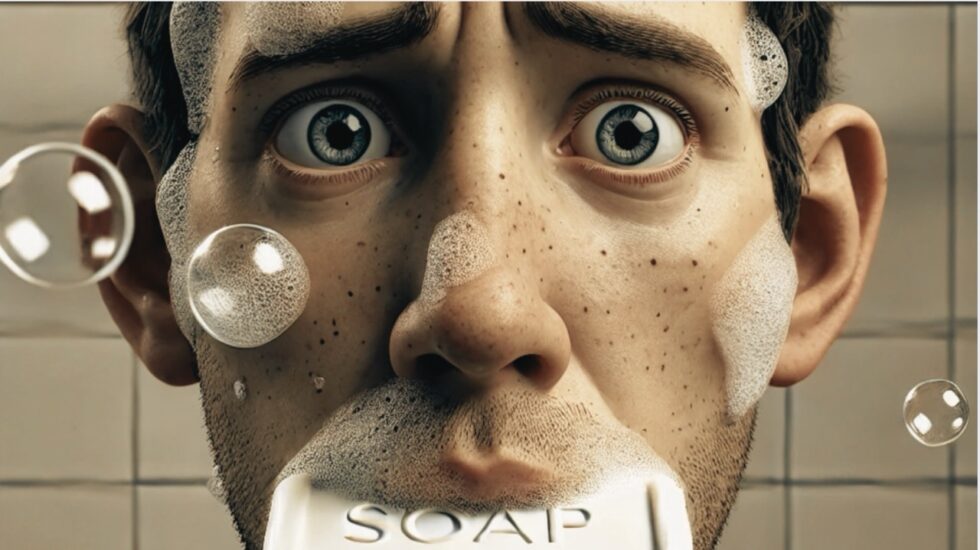Soapy Taste in the Mouth: Causes, Meaning, and When to Take Action

An unusual taste in the mouth, such as the taste of soap, can cause concern. Although this is a rare phenomenon, it may indicate various health problems or be caused by external factors, writes the website G.Business. In this article, we examine the main causes of a soapy taste and ways to eliminate it.
What is a Soapy Taste
The sensation of having soap in your mouth — whether bitter, chemical, or perfumed — is known as dysgeusia, a taste disorder. It may be temporary or chronic, mild or intense, and is often difficult to explain without clinical context. For many, the taste appears suddenly after a meal, while others experience it consistently throughout the day.
The causes of this phenomenon are wide-ranging: from simple lifestyle issues like improperly rinsed dishes to underlying health conditions such as liver disease or chemical exposure.
Everyday Causes You Might Overlook
Residue from Dish Soap or Cleaning Agents
Improperly rinsed plates, glasses, or water bottles are one of the most frequent causes of a soapy aftertaste. This is especially true in cafeterias, shared kitchens, or high-turnover food environments where speed is prioritized over precision.
What to do: Ensure thorough rinsing of all kitchenware, especially when using concentrated detergents or eco-cleaners with plant-based oils.
Genetic Reaction to Cilantro and Similar Herbs
Believe it or not, some people are genetically programmed to perceive cilantro (also known as coriander) as tasting like soap. This is due to a variation in the OR6A2 gene, which increases sensitivity to aldehydes — the same compounds found in some soaps and cleaning products.
What to do: If you find certain herbs trigger the taste consistently, eliminate them from your diet.
Medical and Environmental Factors
Side Effects from Medication
Antibiotics, blood pressure medication, antidepressants, vitamin supplements, and chemotherapy drugs can all interfere with your sense of taste. Even alcohol-based mouthwash may leave a soapy residue.
Business insight: For employers, it's worth noting that staff undergoing medical treatments may experience taste alterations that affect appetite, focus, or social engagement — all relevant for team dynamics.
What to do: Discuss alternatives with your doctor. In some cases, switching brands or dosages resolves the issue quickly.
Dehydration and Reduced Saliva Flow
Low hydration levels can alter the chemical composition of your saliva, which affects how you perceive taste. This can lead to strange sensations — including bitterness, metallic notes, or a soapy aftertaste.
Workplace relevance: Offices with poor hydration culture (few breaks, no free water access) may unknowingly contribute to this problem.
What to do: Increase your water intake to 1.5–2 liters per day and monitor whether the taste improves.
Oral Health Problems
Gum inflammation, tooth decay, abscesses, or poor-quality fillings can cause bacterial imbalances in the mouth. These may trigger unexpected changes in taste — including the flavor of soap or bleach.
What to do: Maintain proper oral hygiene, and schedule regular checkups. Replace your toothbrush every three months.
Red Flags: When the Taste Signals Something Serious
Chemical Exposure in the Workplace
In industrial or medical environments, low-level exposure to chemicals — such as solvents, disinfectants, or aerosol cleaners — can lead to systemic symptoms. These may include fatigue, skin reactions, and changes in taste.
What to do: Use proper personal protective equipment (PPE), check air ventilation systems, and report symptoms to your occupational health officer.
Liver or Kidney Dysfunction
When these organs are unable to detoxify the bloodstream effectively, toxins can accumulate — sometimes manifesting as unusual tastes, bad breath, or persistent fatigue.
What to do: If the taste persists and is accompanied by symptoms like swelling, nausea, or yellowing of the eyes, consult a doctor immediately for blood tests.
When to Seek Medical Attention
You should see a healthcare provider if:
- The soapy taste lasts longer than 3–5 days
- It interferes with eating, drinking, or speaking
- It’s accompanied by nausea, weakness, or digestive issues
- You suspect recent chemical exposure
- Other systemic symptoms (fatigue, swelling, skin issues) appear
Practical Steps to Remove the Soapy Taste
To eliminate or reduce the taste quickly, try the following:
- Rinse your mouth with water or saltwater after eating or taking medication
- Stay hydrated throughout the day
- Avoid herbs or foods that trigger the sensation
- Inspect dishes and water bottles for leftover soap or detergent
- Switch to alcohol-free mouthwash
- Use a stainless steel tongue scraper to clear surface residues
The soapy taste in the mouth is an unusual but usually harmless phenomenon, often linked to external factors such as detergent residue or a specific reaction to food. If this symptom persists or is accompanied by other complaints, it’s important to consult a doctor to determine the underlying cause. Follow the recommendations to maintain your health and well-being.
You might also want to read about magnetic storms in July 2025 in Germany — they can seriously affect your well-being. Learn about symptoms, risks, and what helps.